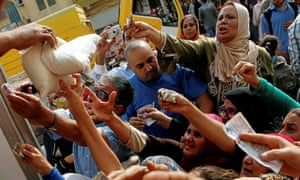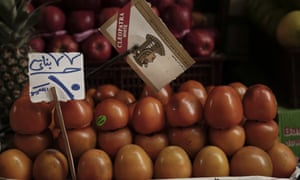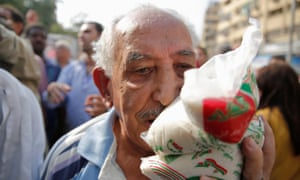The Guardian
A shortage of basic goods and skyrocketing food prices are fuelling discontent inEgypt, where a currency crisis has hit imports.
Sugar has all but vanished from supermarkets and imports of items such as powdered infant formula and even some contraceptives are down.
Egyptian authorities, who have blamed traders and suppliers for hoarding and smuggling goods, said they have so far seized 9,000 tonnes of sugar in raids on factories and warehouses, including facilities belonging to Pepsico and Edita, one of the country’s largest manufacturers of confectionaries. The sugar is intended for resale to the public at subsidised prices.
A man in Cairo was recently arrested and bailed for carrying 10kg of sugar, as this “exceeded possession of amounts reasonable for personal use”, according to Egypt’s largest newspaper, al-Ahram.
Egypt imports about a million tonnes of sugar annually – about a third of its total consumption – but an acute shortage of dollars has cut imports by private traders, leaving the market short.
The dollar shortage, and the suspension of oil aid from Saudi Arabia earlier this month, have also led to a widening gap between the official and parallel market trading rate of Egypt’s currency.
The crisis comes as the government of President Abdel Fatah al-Sisi makes unpopular cuts to a subsidies programme while it waits for the first tranche of a $12bn (£10bn) loan from the International Monetary Fund.
The IMF recently reminded Egypt that it must follow through on previously promised reforms in order to receive the first instalment of the loan, which the regime hopes will stimulate the economy.
Food shortages are not immediately apparent in upscale supermarkets such as Gourmet in Zamalek, an affluent district in central Cairo, but the rise in prices of imported goods are plain to see.
“These prices are going crazy,” one customer said last week as she rifled through packets of mussels in search of calamari.
Mohamed Ehab, a shift manager at the store, said: “Everything is hard to import right now. We used to get the Spanish coconut oil, but now we can’t. We haven’t had any salmon for 20 days.”
The complaints might seem frivolous in a country where the average monthly salary was 868.50 Egyptian pounds (£80) in 2015. But it is nevertheless evidence that the country’s economic woes are beginning to affect those in the upper echelons of Egyptian society, and not just the many already living in poverty.
Given the extent to which political dissent is stifled in Egypt, its citizens have so far been careful to direct their anger exclusively at the economy rather than the regime.
“We’re in Zamalek so this is class A,” said Ehab, referring to the richest sections of Egyptian society, the traditional support base of Sisi, who swept to power in a military coup in 2013.
For some of Egypt’s wealthiest people, it will take more than the rising price of salmon to ignite anger with the government. But for the vast majority, who live on relatively little, rising prices, inflation and the subsidy cuts have had a noticeable impact on their standard of living.
Earlier this month a video of an unnamed tuk-tuk driver ranting about the state of Egypt’s economy went viral. “A poor citizen can’t even find one kilogramme of rice on the street,” he said, arguing that the country’s rulers would face divine judgment for what they were doing to the poor. Two days later, a taxi driver in the coastal city of Alexandria set himself on fire in protest over rising prices.
Price increases and the import crisis have also begun to affect the supply of medicines into tEgypt. “Customers get angry if the medicine they want isn’t there,” said pharmacist Ahmed Elshafei. Branded contraceptive pills and painkillers have become tough or impossible to find in recent months without turning to the parallel market, he said.
“There are people who will buy just one strip of something instead of a whole box, or buy local drugs and ask for the cheapest one. If prices keep increasing this way, people may not be able to afford that one strip,” he said.
Abdel Alim, a baker in the central Garden City district, said he had raised prices across the board because of increases in the price of flour and sugar. Asked whether the rising prices could spark discontent, he said: “It’s not my problem – it’s the problem of whoever is raising the prices.”
There are persistent rumours of protests over the dire economic situation being planned for 11 November, stoked in part by Egyptian media, which accuses the banned Muslim Brotherhood group of organising the demonstrations to spread discontent. Many of those affected by the shortages remember that one of the rallying cries of the country’s revolution in 2011 was “bread and freedom”.
“The government will have to enact subsidy reform and currency devaluation at the same time – and at a time when the economic situation is pretty dire,” said HA Hellyer of the Royal United Services Institute in London. “Throwing all these things together may be quite risky – they might have no choice, but I worry about a social reaction: not protests or demonstrations per se, but riots or things like that, which are far more sporadic and unplanned.”




No comments:
Post a Comment